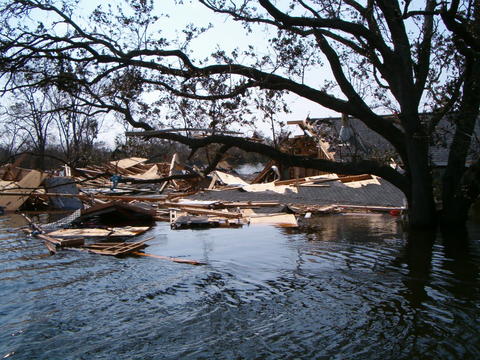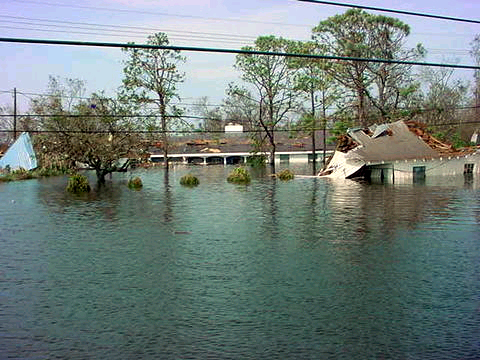

Nearly two weeks ago, reader M.B. sent me a message and an offer. He lives in Louisiana: Hurricane Katrina left his family's home with reparable if unsightly gashes, his father's office building was destroyed. Photographs were to be taken for insurance claims — would I care to publish some of them, remind other readers of the disaster, and perhaps comment? I wrote back to M.B. that I was happy to do so.
The photographs arrived by e-mail yesterday. As it would happen, both were skillfully shot. The tree in the first photograph winds upward through a golden mean, its pitch bark in contrast to the powder blue sky far behind it and the pale oak, collapsed and half-submerged remains of the office between the two. Power and telephone lines offset an odd-angle incline of the second photograph's horizon. The office wreckage recedes as the eye runs along the water's faint crests; then to an array of small trees and finally to the face of a second building, intact but several feet too short; then upwards on the limbs of trees to the sky, and then off to the edge, along a black wire.
These photographs only subtly convey the destruction, nothing as dramatic as the famous image from the 1889 Johnstown, Pennsylvania flood. A Georgian-style house is pictured fallen backwards, resupine, its fašade pierced by a javelin of a tree. The sight of it is shatteringly improbable even in black-and-white, something like an anthropologist's documentation of aboriginal elephantitis in its perversion of an object of man, as one contemplates that before the nearby dam burst there stood a regal home with a front lawn in shade.
Some of us will be deceived, and one would hardly say that we can help it. For these two glimpses of Louisiana we have been given, only in knowledge and memory does the pain of loss reside. Behind the split and soaked walls, where we can't see, are likely all of what composed an office until the cusp of August and September — desks, chairs, computers, printers, telephones, file cabinets, memos, records, decorations, magazines, books, trinkets, family pictures, mementos. Did M.B.'s father have time to evacuate a few of the essentials? Did something happen to find its way home, or into the car, in the days preceding?
How luck and the hand of greater authority spare us in strange ways: in May of 1989, when I was eleven, a series of powerful thunderstorms swept Ohio. The strongest storms were heralded a day in advance; my family and our neighbors discussed "the storm" all afternoon and evening. My parents, at first anticipating a tornado, carried treasures down to the basement. But before bed that night, as the winds picked up, they decided to return everything to the first floor. The next morning, thirteen inches of rainwater came and went. What would have been drowned? For one, my father's beloved Martin Dreadnought. That brassy acoustic guitar my father purchased at Manny's in New York City nearly forty years ago; his Excalibur, it was by playing that for a local church that he met my mother, an irony driven home by the fact that the wedding photographs sat beside the Martin.
Good fortune, of course, has left me with no comparable experience. I can only describe the faint sense of horror in examining the rubble; vicarious audience is impossible. Thankfully, no considerate Louisianan, Floridian, Alabamian or Mississippian is asking for empathy so much as sympathy — and anyway, charity requires but equal parts compassion and generosity. So for what ignorance to which those of us on northern high ground must admit, we have donation and solace to give; but more importantly hope and faith, which was always our only redoubt.